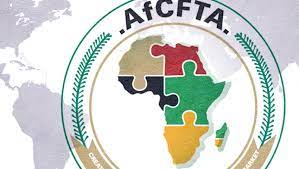
The Organised Private Sector (OPS) in the country has said lack of a National Shipping Line and the absence of basic infrastructures in the country is a big threat to the success of the African Continental Free Trade Agreement (AfCFTA).
In a chat with our correspondent, key stakeholders and members of the various OPS groups in the country, while reacting to Nigeria’s planned commencement of trading under AfCFTA by August this year, stated that some of the bottlenecks responsible for why the country is finding it difficult to engage in Intra African trade are still there. They lamented that lack of basic infrastructure and a national shipping line may hinder the success of the AfCFTA.
Recall that Shipping Position Daily had exclusively reported last week that Nigeria is likely to commence trading under AfCFTA before the end of August 2023, as exportable goods have already been decided on.
However, in a chat with our correspondent, the Director General of the Manufacturers Association of Nigeria (MAN); Mr. Segun Ajayi Kadiri while reacting to the country’s planned commencement of trading under AfCFTA, explained that the African continent is surrounded by water, but lacks the basic infrastructure that will enable movement of goods and services from one country to the other.
He lamented that there is no shipping line an exporter or manufacturer can easily adopt for the movement of goods outside Nigeria while adding that air freight to some other African countries may be too expensive for some manufacturers and exporters to bear.
He said: “We still do not have any train services or shipping line that will be able to complement trading, so basically infrastructure still remains a challenge. A national shipping line is desirable because it can then provide a platform for targeted market penetration. This can easily help us to identify hubs where our products will go and then have easy penetration”.
Explaining further, he said: “For instance, if we get our products to the port in Durban (South Africa), it is easy for it to go from there to Zambia and then connect it to the biggest economy in the southern part of Africa.
“So, if you do not have a Shipping line it makes things rather difficult. You can imagine we can actually control the outflow and inflow of merchandise to our country, if we have a Shipping line and this is not too big for Nigeria to do, this will significantly boost trade and save us the hassle of going to Europe before you arrive at another African country”.
Speaking on other issues that may hinder the AfCFTA’s successful take-off, the MAN DG said, “in terms of readiness; in the first instance nobody told us not to trade among ourselves. So AfCFTA may not be the reason why we are going to trade. The reason why AFCFTA is instrumental is because it is creating a platform that will enable us to trade more. So why we have not traded before is because there are hindrances to intra-African trade in transaction in terms of FOREX conversion, logistics and what have you”.
Giving more insight, he explained that, “In some cases, you have to move your products from Nigeria to Europe before it gets to another African country. There is also the issue of being not competitive. What is important is not just for you to export your products, it is for your products to find a market and to sell, because it doesn’t make sense for me to say I want to export my products to Cote d’Ivoire just to go and sit on a shelf, so I will become a loser. So, it is actually being competitive when you export your products that is critical”.
Speaking further, he said “it is a good feat that Nigeria is set for export although our products have been finding their way into foreign markets; though mostly informal. But what we are talking about is that the product will now go in a formalised manner and then we will be able to have best returns on our exports. So, it is a welcome development.
Lamenting Nigeria’s exclusion from the list of countries that opened trading on AfCFTA, Kadiri said: “You will recall that the AfCFTA secretariat selected about seven countries for trial run and Nigeria was not included., I see that as a big mistake because even now on-lookers particularly from outside the continent believe that if Nigeria is not involved in any scheme, then you can’t effectively talk about intra-African trade taken place”.
“However, I do know that there were issues about the rule of origin, there were issues about dispute resolution mechanisms and the readiness of the Customs of various African countries to have a seamless flow.
“So, if we have received the assurance that we are ready for trade in a few weeks, it’s a welcome development, but certainly it remains on a limited scale and one is looking forward to being competitive because yes, we’ve been able to export but at what cost?
Speaking also with our correspondent, the Chief Executive Officer, Center for Promotion of Private Enterprise (CPPE) Dr. Muda Yusuf was however pessimistic about Nigeria’s planned trading under AfCFTA by August this year.
He said: “I don’t see much on the ground in terms of preparations and also in terms of adequate sensitization and awareness as to which products are on the list, which products are protected. You know it’s not all products that you can trade with or trade-in, you have to have information on the destination countries for your export for you to know the goods that are on the protected list.
“So a whole lot of information that needs to be out there, I am not sure it’s out there, not enough information on trade and services, you know trade is not just about goods. Most of the professionals in the country don’t have any information, as to some of the protocols, all these information are still very sketchy. I am not sure we have that level of awareness which will enhance readiness and even the manufacturers too, they are still not comfortable about the whole situation”.
He noted that, “all the complaints they had before we signed on to AfCFTA at that time are still there, we still have the problem of power, multiple taxation and all of that, so if we start now how can they compete, manufacturers are still buying diesel at a high rate, the country just withdrew subsidy and various taxes have been introduced. So with all of these things, we are not very enthusiastic”.
Yusuf also doubted the readiness of the Nigeria Customs Service (NCS). He said, “Even the Customs are not sounding as if they are particularly ready for this and they are also not very excited about it, there was a time I heard the Customs CG saying that AfCFTA will affect their revenue and you know the mindset of Customs, its just revenue.
So, I doubt the state of readiness of all the critical institutions. If it is an aspiration that is fine, we don’t need to discourage them”.
However, reacting to the readiness of the NCS, the National Public Relations Officer of the service, Abdullahi Maiwada told our correspondent that the service is ready for the AfCFTA, he said the service has trained its officers on the rules of origin which is the most important aspect of the trade.
“Customs is a critical stakeholder in the implementation of AfCFTA, because this kind of trade agreement is important to us, one of our functions you know has to do with trade facilitation and these efforts of AFCFTA is about trade facilitation and Customs is the competent authority for determination of rules of origin because one of the criteria for an item to be part of this agreement, or this preparation trade agreement is identifying a criteria you know that, the item is coming from that country of origin and one of those is the rules of origin, so we are responsible for stamping and approving certificate of origin.
“Then secondly, Customs is the Vice Chair under the trade facilitation committee headed by the Ministry of Trade and Investment. So recently there was training by the International Monetary Fund (IMF). They came into Customs and trained our officers on the application of rules of origin when it comes to AfCFTA because one of the contentions of implementing AfCFTA has to do with rules of origin. If you don’t have an origin criterion, people can bring in goods from what we call third countries and dump them maybe without relative value addition and claim that those goods originate from the countries that are under that preparation agreement.
Follow us on Facebook/ twitter















